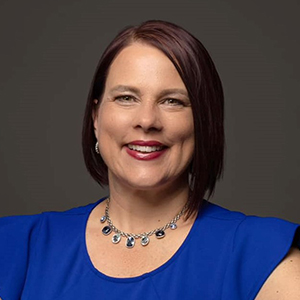
Heather McBroom started a process serving company in 2010; it was her first business. Now, as the new executive director of The Thrive Network, she uses her years of experience as a business owner to empower Southeast Colorado Springs residents to start their own small businesses. The ultimate goal: to revitalize that community through entrepreneurship.
Thrive takes three cohorts a year for its intensive, four-month, 160-hour entrepreneur training course, which provides hands on education, mentorship, networking and scholarship opportunities. It’s designed to help entrepreneurs through the struggles that emerge in the early years of business ownership. The course culminates in a public pitch night that introduces new graduates and their business ideas to the community. The most recent pitch night, celebrating Thrive’s 13th cohort, was Aug. 26.
Why is Thrive’s work important?
Thrive is an entrepreneurship incubator program, and the work we do is so important because we work a lot with the BIPOC, low-income, and criminal justice involved communities. A lot of times [these communities] won’t seek out other resources. We bring a level of trust and community to them, introducing them to many different people throughout the community. They also get a mentor — my mentors are all community leaders — and they just get an opportunity that they wouldn’t have otherwise. It is a free program, so we want no barrier to entry, and we work with people even in those beginning stages of just ‘I think I want to be an entrepreneur but I don’t know yet for sure.’
We’ve heard your next cohort will be larger and that there’s a waitlist — tell us about your growing popularity and what it could mean for Colorado Springs.
We have been so fortunate. I guess it’s a good problem and a bad problem, right? I don’t like to tell people ‘No,’ but we have had a waitlist. We have had about 40 applicants per cohort, and typically we take 15, so we were telling more people no than we were telling yes. Now we’re going to try to run a 25-person cohort.
We really want to make sure that we don’t change anything about the program in terms of how much one-on-one help you get and how hands on we are.
Mayor Yemi Mobolade was a previous leader of Thrive. How can you leverage that relationship for the good of the cohorts and the nonprofit?
I plan to try to leverage that in a way that maybe we can receive some sort of city funding at some point to help the program expand — not just in the Southeast, but other BIPOC communities. We find that it’s not just the Southeast that’s applying, so we’d like to be conscious of that.
We want to translate into a Spanish speaking program as well, and run at least one Spanish-speaking cohort. We also want to run one that’s specifically criminal justice involved because they have their own kind of unique problems that they’re dealing with — and I think it would be helpful for them to be around people like them and have their own cohort.
Do you get a lot of applications from people who are criminal justice involved?
… We don’t ask a lot of questions about that, but I would say maybe half of the demographic that we serve report some sort of criminal justice involvement. We’d like to work more closely with those who are in a reintegration program. We have a memorandum of understanding with [Springs-based training and employment support nonprofit] CommunityWorks, so they’re kind of our connection to that community. We understand that for a lot of them, they need to start in the mindset stage. They know they want to start a business but they don’t know what business necessarily — and we do a lot in our program to validate business ideas. It’s a really good way to help them figure out if that’s truly the path they want to take.
Can you give us an example of a Thrive success story?
It’s really commonly known that there are many places in Colorado Springs that are what we call ‘day care deserts.’ It’s really important that we get childcare facilities to open up and create spaces for these kids — not only for the kids and parents, but also for the parents to be able to going back to work. We had one woman who started a day care. It’s called The Lighthouse. Her name is Jackie Lujan and she opened up her first location in 80903; that was where she could find a suitable location. She filled up very quickly and now she’s going to be opening up a second location at the Family Success Center. So, in just a year of being open, she’s now getting that second location and actually helping the community at the Family Success Center, which will be providing free day care for people who are in their programs.
How successful have previous cohorts been — and how have you measured success?
We now have implemented several surveys that you take throughout the program and that you take once a year [after graduating]. What we look for in those surveys is how much revenue have you generated this year versus last year, to see the impact of how your business is growing. How many jobs did you create in your business full time or part time in the last year? We’re really looking to make sure that people are not just in business but they’re making money year after year — and if not, stepping in to see where we can help them out to make sure that they are more successful.
In terms of how you know somebody is successful — to us success is determined when they graduate and they have a real increase in knowledge. Not everybody’s ready to start a business after they graduate. … It just depends. It might take a little bit of time for [a graduate] to actually launch their businesses, but we’re working with them throughout that whole time to make sure that they continue to move forward on their business ideas.
What advice do you have for people looking to start a small business in Colorado Springs?
There is so much to do and so much to learn. My biggest advice is, get out there. Know what programs are available. Know what support systems that you can create. [Pikes Peak Small Business Development Center] is a great place to meet with mentors. SCORE is another great organization to meet with mentors. Don’t feel like you have to do it alone.


